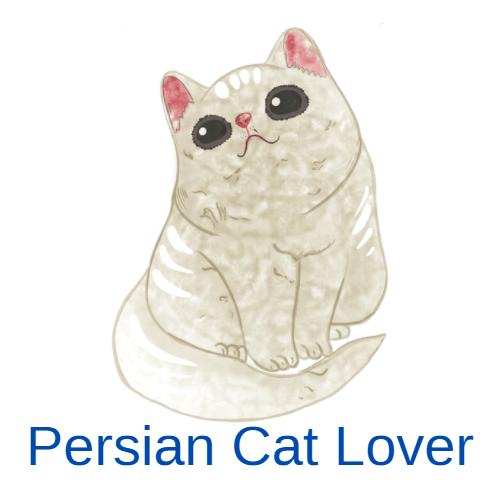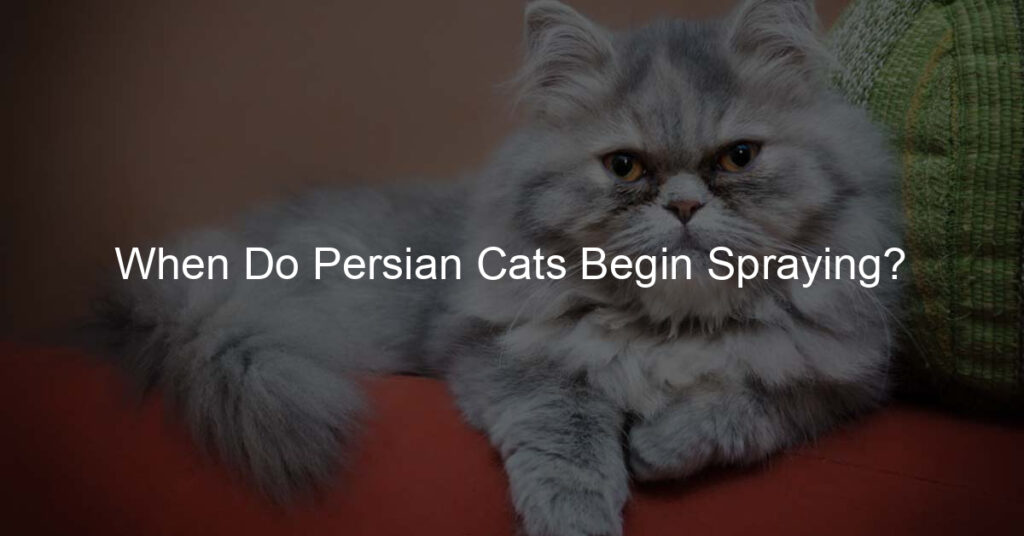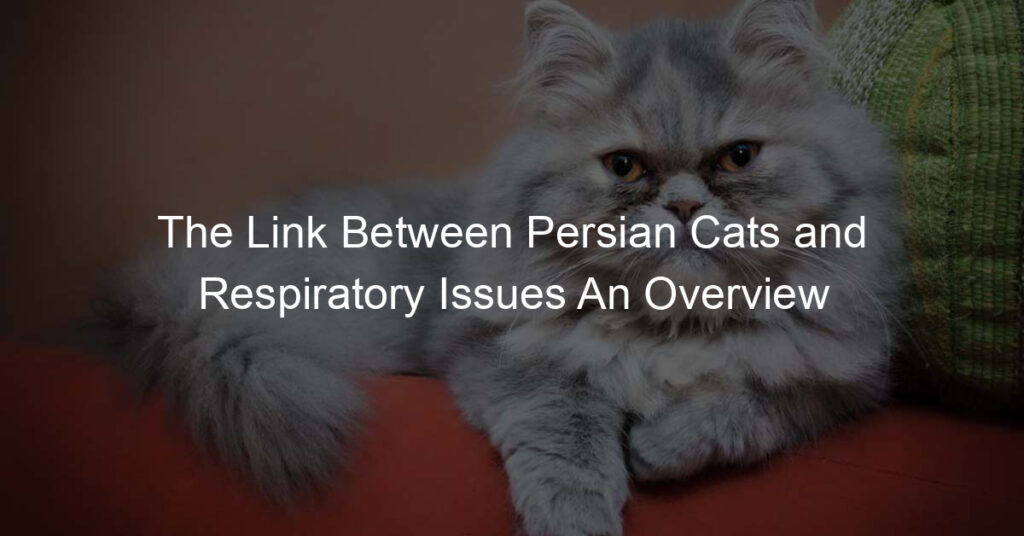Persian cats are known for their gorgeous long coats and sweet personalities. But unfortunately, one of the less desirable traits linked to the breed is spraying. So when do Persian cats begin spraying?
Unfortunately, there is no definitive answer as it depends from cat to cat. Generally speaking, Persian cats start spraying around 4-6 months of age if they have not been spayed or neutered.
This typically coincides with sexual maturity and is a way to mark their territory in your home. However, spraying can also be triggered by stress or environmental changes, so it’s essential to keep an eye on your kitty if you notice any changes in behavior.
What Can I Do To Prevent My Persian Cat From Spraying?
If you’re the proud owner of a Persian cat, you may be wondering when they start spraying and what you can do to prevent it. Of course, spraying is a normal behavior in cats, but it’s important to understand why and when cats tend to spray so that you can take steps to avoid this behavior.
The answer as to when Persian cats begin spraying depends on the age of the individual cat. Generally speaking, most cats will not start spraying until they reach sexual maturity between 6–9 months old.
During this time, hormones are starting to kick in, and your kitty may become more territorial or feel the urge to mark their area. Therefore, it’s crucial that during this period, you pay close attention to any changes in your pet’s behavior.
To prevent your Persian cat from spraying, there are a few steps you can take. For example, ensure they’re spayed or neutered to reduce the urge to mark their territory with urine.
You should also provide plenty of stimulation, including interactive toys and scratching posts so that your pet has an outlet for their energy.
Additionally, be sure to keep any litter boxes in a quiet area of the house away from traffic, as cats may spray if they feel threatened by other animals or people in the same space.
Lastly, try to avoid punishing them when they do spray, as it will only serve to increase their anxiety and cause them more stress. Instead, reward them for good behavior and praise them frequently for using the litter box.
How Often Will a Persian Cat Spray?
When it comes to marking their territory, Persian cats can be quite consistent. It is not uncommon for them to spray several times a day or even every other day. The frequency of spraying will depend on the cat’s environment and personality.
Some cats may only spray once in a while, while others might do it more often. Regardless of how often your Persian cat sprays, it is important to address the issue as soon as possible to prevent any further behavior issues from developing.
If you are unsure why your Persian cat is spraying and want to get to the root of the problem, speaking with a veterinarian or animal behaviorist can help. They can provide additional insight into why your pet might be acting out this way and offer suggestions for getting them back on track.
With the right approach, you can help your Persian cat feel more comfortable and secure in their environment without having to resort to spraying as a way of marking their territory.
Remember that just like any other pet, cats have their personalities and behaviors. You need to understand your Persian cat. Their needs, wants, habits, and behavior so that you can better care for them.
If you believe that your Persian cat is peeing outside of the litter box or exhibiting any other concerning behavior, it’s best to consult a professional who has experience working with cats.
They may be able to provide additional insight into why they’re acting out in such a manner and provide you with strategies for how to handle the situation.
Does Spaying or Neutering Affect Spraying in Persian Cats?
Persian cats can begin spraying at 6 months of age. spaying or neutering your cat may reduce the chances of spraying. These surgeries can prevent hormones from developing, resulting in a decrease in spraying activity. sterilization helps eliminate frustration or confusion.
For some cats, however, no amount of surgery will stop them from marking their territory with urine. If this is the case for your pet, there are several other strategies you can use to discourage frequent urination and reduce messes around your home.
Behavioral training is vital for teaching cats appropriate behavior patterns and eliminating undesirable habits. You can also use a litter box the right size for your Persian, as cats may spray when they feel cramped or uncomfortable in their litter area.
Lastly, providing a good living environment with access to plenty of scratching posts and toys can help promote healthy play and reduce spraying activity.
Is Spraying in Persian Cats Normal Behavior?
Spraying is a normal behavior for cats of all breeds, including Persian cats. However, it’s important to note that there are some cases where spraying can be caused by medical or other external issues.
Persian cats usually begin spraying between 6 and 12 months when they reach sexual maturity. At this stage in their lives, cats may start displaying territorial behavior, such as spraying urine to mark their territory or attract mates.
Some Persian cat owners report an increase in spraying during the springtime; this is likely due to the presence of more potential mates during mating season.
If your Persian cat begins spraying more than usual, it could be a sign that something is wrong, and you should take them to the vet to rule out any medical issues.
On the other hand, if there is no underlying health problem, it’s essential to provide them with plenty of mental stimulation and positive reinforcement to ensure they stay happy and healthy.
Spraying in cats can be a nuisance, but by understanding why it occurs and taking the necessary steps, you can help your Persian cat remain safe and comfortable. With proper care, spraying should be fine for most owners of these beautiful felines.
What Is the Best Way To Clean Up After Persian Cats Sprays?
When it comes to Persian cats, the very first question that comes to mind is when do they begin spraying? Unfortunately, this behavior can start as young as 6 months old, so it’s essential to be aware of this possibility.
If your Persian cat does happen to spray, the best way to clean up after them is with an enzymatic cleaner specifically formulated for pet stains and odors. These types of cleaners work by breaking down odor-causing molecules instead of just masking them with a scent.
They are also safe for pets and humans; however, make sure you read the instructions carefully before using them.
For fresh urine spots, blot up any excess liquid before applying the cleaner and allow it to soak in for a few minutes before wiping it up. After that, be sure to ventilate the area with a fan or open window and let it dry completely.
If your Persian cat has been spraying consistently in one spot, you may need something a bit more powerful such as an odor-eliminating fogger. These are available in most pet stores and work by releasing millions of microscopic particles that neutralize odors on contact.
Finally, clean any surfaces your Persian cat has sprayed with a mild detergent after using the enzymatic cleaner or fogger to remove any additional residue. This will help reduce their chances of repeatedly returning to the same spot.
What Age Do Persian Cats Usually Stop Spraying?
Persian cats usually stop spraying when they reach sexual maturity, which typically happens between 6 to 8 months old. After reaching this age, they will no longer need to mark their territory and will likely never spray again.
If you are seeing signs of your Persian cat spraying after the age of 8 months, it is worth having a vet check-up, as there may be an underlying medical condition contributing to the behavior.
It is important to note that if you get two male Persians or a female and male pair, then one of them may resume spraying after reaching sexual maturity because they feel the need to re-establish their dominance over the other cat to safeguard their turf.
In some cases, it may be wise to separate the cats until they learn to co-exist without spraying to prevent a long-term problem.
In any case,
Spaying or neutering your Persian cat as soon as possible after they reach the age of 8 months old (or when recommended by your vet) is essential. This will help reduce their territorial instincts and also has additional health benefits such as reducing the chance of certain cancers.
With proper care and attention, it should be easy for you and your furry friend(s) to enjoy many happy years together without needing to worry about spraying!














